Cross-Cultural Management Analysis: Saudi Arabia, Myanmar, Malaysia
VerifiedAdded on 2021/02/19
|13
|3384
|40
Report
AI Summary
This report provides an in-depth analysis of cross-cultural management, comparing the business environments of Saudi Arabia, Myanmar, and Malaysia. It explores the cultural characteristics of each country, including values, communication styles, motivation, leadership approaches, and organizational structures. The report utilizes Hofstede's cultural dimensions to analyze and compare the three countries, highlighting the impact of cultural differences on business practices. The study examines how these cultural factors influence employee behavior, leadership effectiveness, and overall organizational performance. Furthermore, the report provides insights into how multinational companies can navigate cultural differences to achieve success in these diverse markets. The study offers valuable information for students and professionals seeking to understand and manage cross-cultural challenges in global business settings.
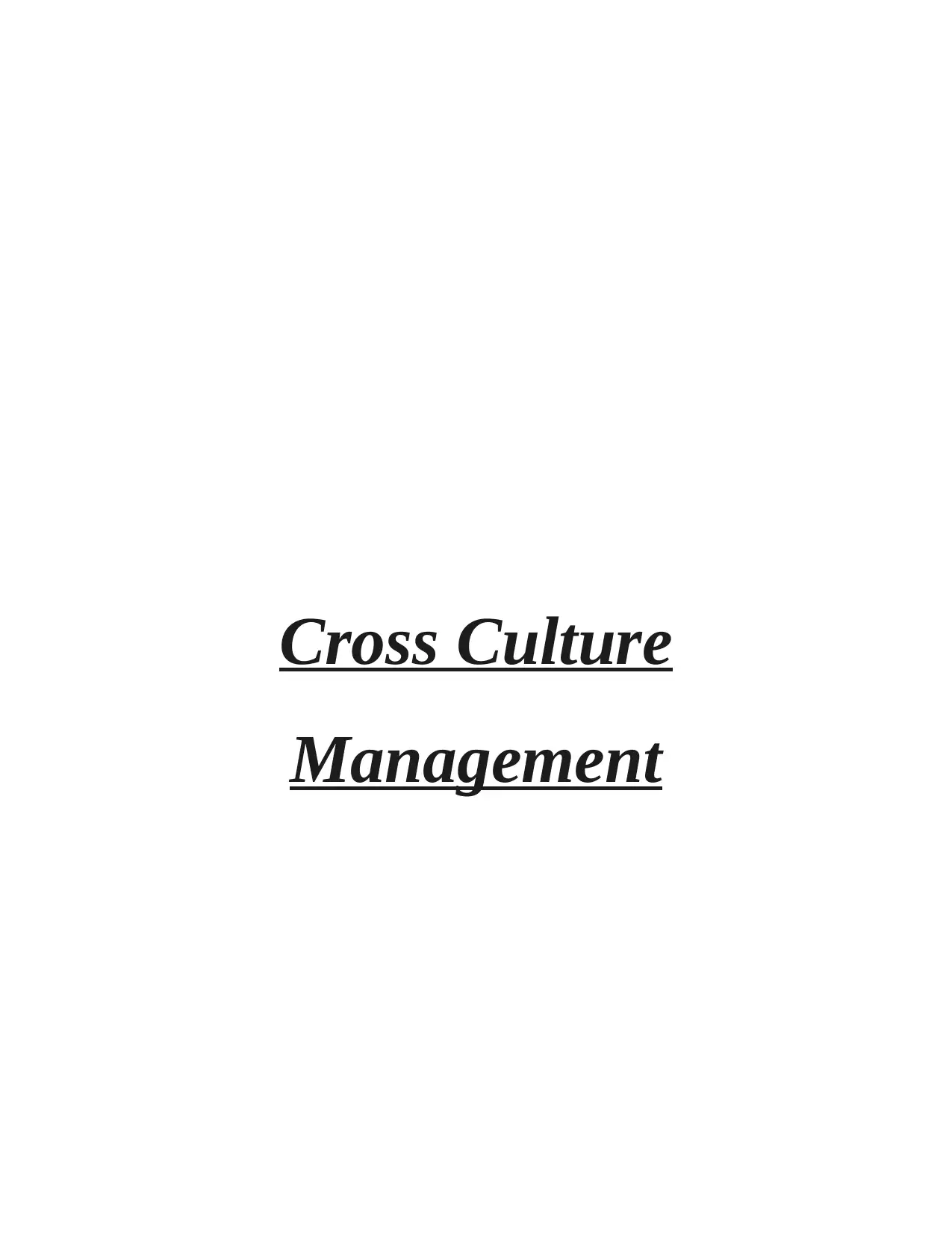
Cross Culture
Management
Management
Paraphrase This Document
Need a fresh take? Get an instant paraphrase of this document with our AI Paraphraser
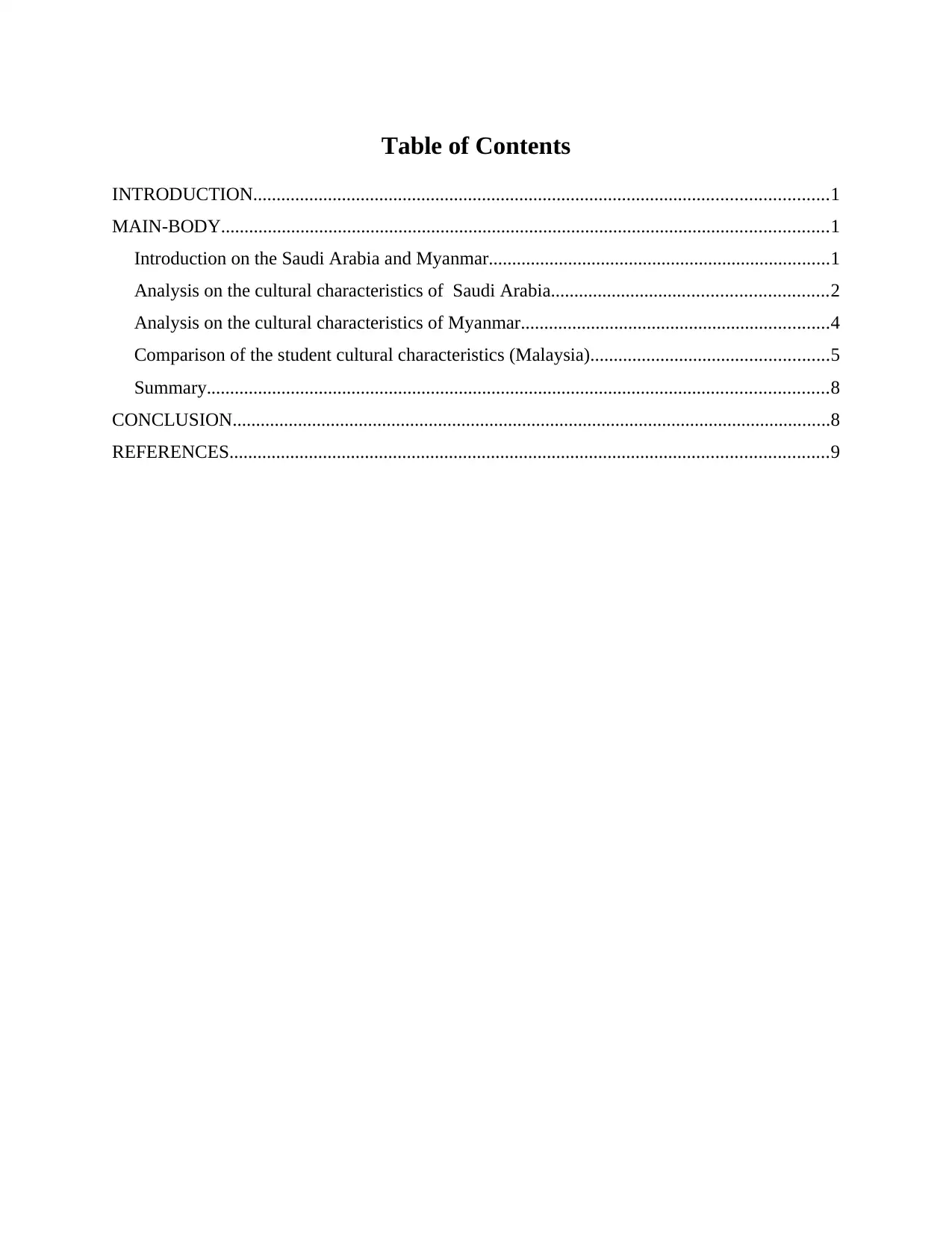
Table of Contents
INTRODUCTION...........................................................................................................................1
MAIN-BODY..................................................................................................................................1
Introduction on the Saudi Arabia and Myanmar.........................................................................1
Analysis on the cultural characteristics of Saudi Arabia...........................................................2
Analysis on the cultural characteristics of Myanmar..................................................................4
Comparison of the student cultural characteristics (Malaysia)...................................................5
Summary.....................................................................................................................................8
CONCLUSION................................................................................................................................8
REFERENCES................................................................................................................................9
INTRODUCTION...........................................................................................................................1
MAIN-BODY..................................................................................................................................1
Introduction on the Saudi Arabia and Myanmar.........................................................................1
Analysis on the cultural characteristics of Saudi Arabia...........................................................2
Analysis on the cultural characteristics of Myanmar..................................................................4
Comparison of the student cultural characteristics (Malaysia)...................................................5
Summary.....................................................................................................................................8
CONCLUSION................................................................................................................................8
REFERENCES................................................................................................................................9
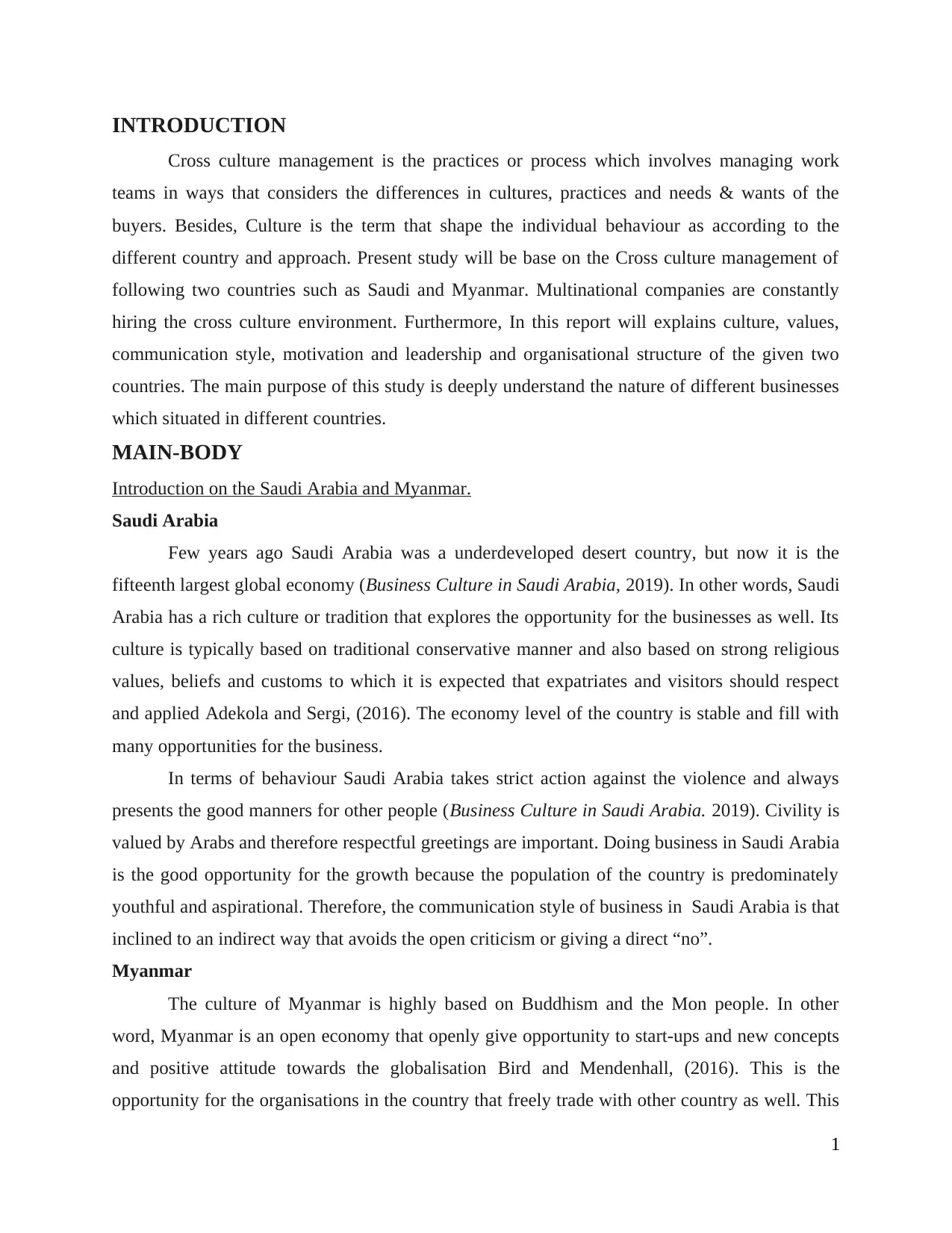
INTRODUCTION
Cross culture management is the practices or process which involves managing work
teams in ways that considers the differences in cultures, practices and needs & wants of the
buyers. Besides, Culture is the term that shape the individual behaviour as according to the
different country and approach. Present study will be base on the Cross culture management of
following two countries such as Saudi and Myanmar. Multinational companies are constantly
hiring the cross culture environment. Furthermore, In this report will explains culture, values,
communication style, motivation and leadership and organisational structure of the given two
countries. The main purpose of this study is deeply understand the nature of different businesses
which situated in different countries.
MAIN-BODY
Introduction on the Saudi Arabia and Myanmar.
Saudi Arabia
Few years ago Saudi Arabia was a underdeveloped desert country, but now it is the
fifteenth largest global economy (Business Culture in Saudi Arabia, 2019). In other words, Saudi
Arabia has a rich culture or tradition that explores the opportunity for the businesses as well. Its
culture is typically based on traditional conservative manner and also based on strong religious
values, beliefs and customs to which it is expected that expatriates and visitors should respect
and applied Adekola and Sergi, (2016). The economy level of the country is stable and fill with
many opportunities for the business.
In terms of behaviour Saudi Arabia takes strict action against the violence and always
presents the good manners for other people (Business Culture in Saudi Arabia. 2019). Civility is
valued by Arabs and therefore respectful greetings are important. Doing business in Saudi Arabia
is the good opportunity for the growth because the population of the country is predominately
youthful and aspirational. Therefore, the communication style of business in Saudi Arabia is that
inclined to an indirect way that avoids the open criticism or giving a direct “no”.
Myanmar
The culture of Myanmar is highly based on Buddhism and the Mon people. In other
word, Myanmar is an open economy that openly give opportunity to start-ups and new concepts
and positive attitude towards the globalisation Bird and Mendenhall, (2016). This is the
opportunity for the organisations in the country that freely trade with other country as well. This
1
Cross culture management is the practices or process which involves managing work
teams in ways that considers the differences in cultures, practices and needs & wants of the
buyers. Besides, Culture is the term that shape the individual behaviour as according to the
different country and approach. Present study will be base on the Cross culture management of
following two countries such as Saudi and Myanmar. Multinational companies are constantly
hiring the cross culture environment. Furthermore, In this report will explains culture, values,
communication style, motivation and leadership and organisational structure of the given two
countries. The main purpose of this study is deeply understand the nature of different businesses
which situated in different countries.
MAIN-BODY
Introduction on the Saudi Arabia and Myanmar.
Saudi Arabia
Few years ago Saudi Arabia was a underdeveloped desert country, but now it is the
fifteenth largest global economy (Business Culture in Saudi Arabia, 2019). In other words, Saudi
Arabia has a rich culture or tradition that explores the opportunity for the businesses as well. Its
culture is typically based on traditional conservative manner and also based on strong religious
values, beliefs and customs to which it is expected that expatriates and visitors should respect
and applied Adekola and Sergi, (2016). The economy level of the country is stable and fill with
many opportunities for the business.
In terms of behaviour Saudi Arabia takes strict action against the violence and always
presents the good manners for other people (Business Culture in Saudi Arabia. 2019). Civility is
valued by Arabs and therefore respectful greetings are important. Doing business in Saudi Arabia
is the good opportunity for the growth because the population of the country is predominately
youthful and aspirational. Therefore, the communication style of business in Saudi Arabia is that
inclined to an indirect way that avoids the open criticism or giving a direct “no”.
Myanmar
The culture of Myanmar is highly based on Buddhism and the Mon people. In other
word, Myanmar is an open economy that openly give opportunity to start-ups and new concepts
and positive attitude towards the globalisation Bird and Mendenhall, (2016). This is the
opportunity for the organisations in the country that freely trade with other country as well. This
1
⊘ This is a preview!⊘
Do you want full access?
Subscribe today to unlock all pages.

Trusted by 1+ million students worldwide
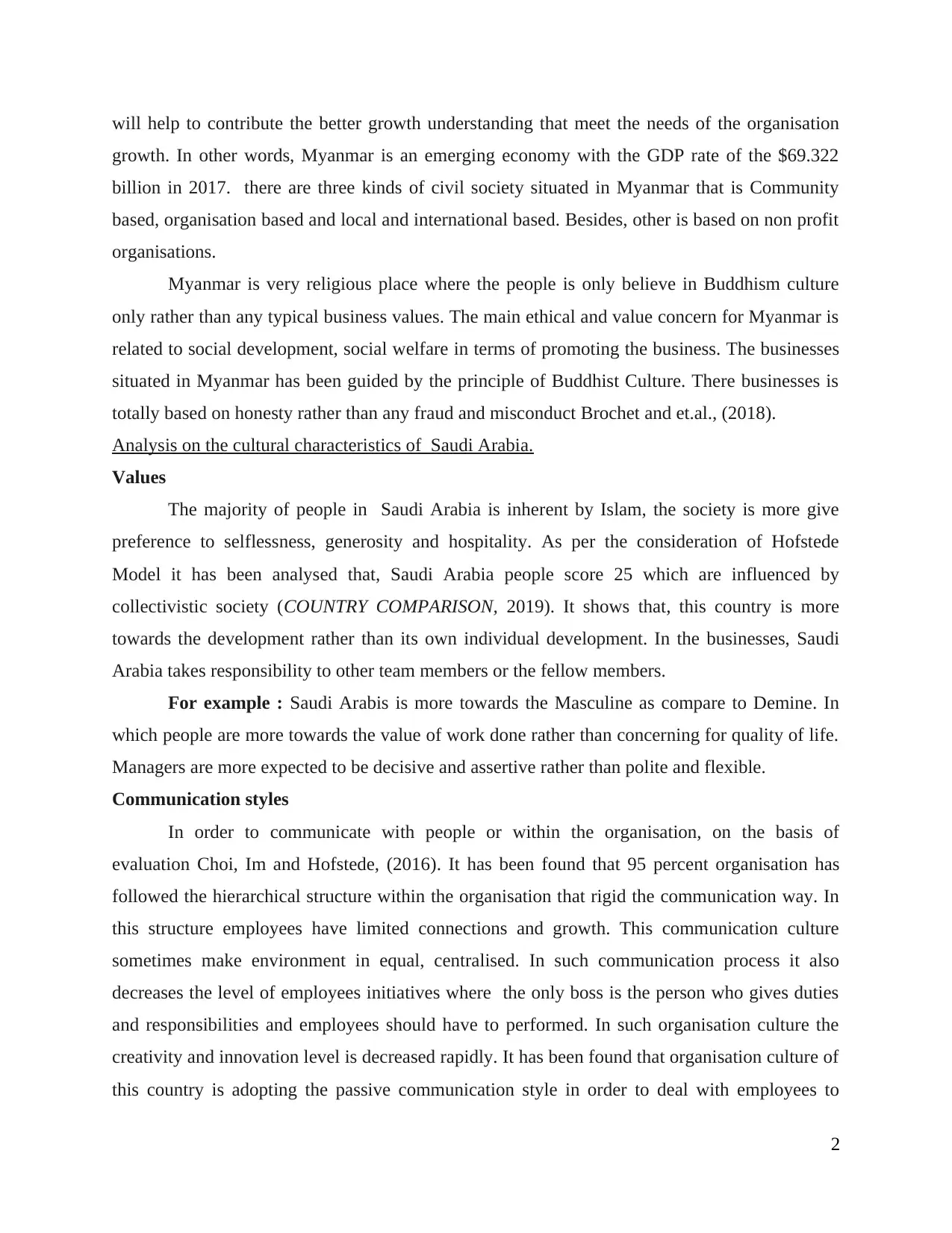
will help to contribute the better growth understanding that meet the needs of the organisation
growth. In other words, Myanmar is an emerging economy with the GDP rate of the $69.322
billion in 2017. there are three kinds of civil society situated in Myanmar that is Community
based, organisation based and local and international based. Besides, other is based on non profit
organisations.
Myanmar is very religious place where the people is only believe in Buddhism culture
only rather than any typical business values. The main ethical and value concern for Myanmar is
related to social development, social welfare in terms of promoting the business. The businesses
situated in Myanmar has been guided by the principle of Buddhist Culture. There businesses is
totally based on honesty rather than any fraud and misconduct Brochet and et.al., (2018).
Analysis on the cultural characteristics of Saudi Arabia.
Values
The majority of people in Saudi Arabia is inherent by Islam, the society is more give
preference to selflessness, generosity and hospitality. As per the consideration of Hofstede
Model it has been analysed that, Saudi Arabia people score 25 which are influenced by
collectivistic society (COUNTRY COMPARISON, 2019). It shows that, this country is more
towards the development rather than its own individual development. In the businesses, Saudi
Arabia takes responsibility to other team members or the fellow members.
For example : Saudi Arabis is more towards the Masculine as compare to Demine. In
which people are more towards the value of work done rather than concerning for quality of life.
Managers are more expected to be decisive and assertive rather than polite and flexible.
Communication styles
In order to communicate with people or within the organisation, on the basis of
evaluation Choi, Im and Hofstede, (2016). It has been found that 95 percent organisation has
followed the hierarchical structure within the organisation that rigid the communication way. In
this structure employees have limited connections and growth. This communication culture
sometimes make environment in equal, centralised. In such communication process it also
decreases the level of employees initiatives where the only boss is the person who gives duties
and responsibilities and employees should have to performed. In such organisation culture the
creativity and innovation level is decreased rapidly. It has been found that organisation culture of
this country is adopting the passive communication style in order to deal with employees to
2
growth. In other words, Myanmar is an emerging economy with the GDP rate of the $69.322
billion in 2017. there are three kinds of civil society situated in Myanmar that is Community
based, organisation based and local and international based. Besides, other is based on non profit
organisations.
Myanmar is very religious place where the people is only believe in Buddhism culture
only rather than any typical business values. The main ethical and value concern for Myanmar is
related to social development, social welfare in terms of promoting the business. The businesses
situated in Myanmar has been guided by the principle of Buddhist Culture. There businesses is
totally based on honesty rather than any fraud and misconduct Brochet and et.al., (2018).
Analysis on the cultural characteristics of Saudi Arabia.
Values
The majority of people in Saudi Arabia is inherent by Islam, the society is more give
preference to selflessness, generosity and hospitality. As per the consideration of Hofstede
Model it has been analysed that, Saudi Arabia people score 25 which are influenced by
collectivistic society (COUNTRY COMPARISON, 2019). It shows that, this country is more
towards the development rather than its own individual development. In the businesses, Saudi
Arabia takes responsibility to other team members or the fellow members.
For example : Saudi Arabis is more towards the Masculine as compare to Demine. In
which people are more towards the value of work done rather than concerning for quality of life.
Managers are more expected to be decisive and assertive rather than polite and flexible.
Communication styles
In order to communicate with people or within the organisation, on the basis of
evaluation Choi, Im and Hofstede, (2016). It has been found that 95 percent organisation has
followed the hierarchical structure within the organisation that rigid the communication way. In
this structure employees have limited connections and growth. This communication culture
sometimes make environment in equal, centralised. In such communication process it also
decreases the level of employees initiatives where the only boss is the person who gives duties
and responsibilities and employees should have to performed. In such organisation culture the
creativity and innovation level is decreased rapidly. It has been found that organisation culture of
this country is adopting the passive communication style in order to deal with employees to
2
Paraphrase This Document
Need a fresh take? Get an instant paraphrase of this document with our AI Paraphraser
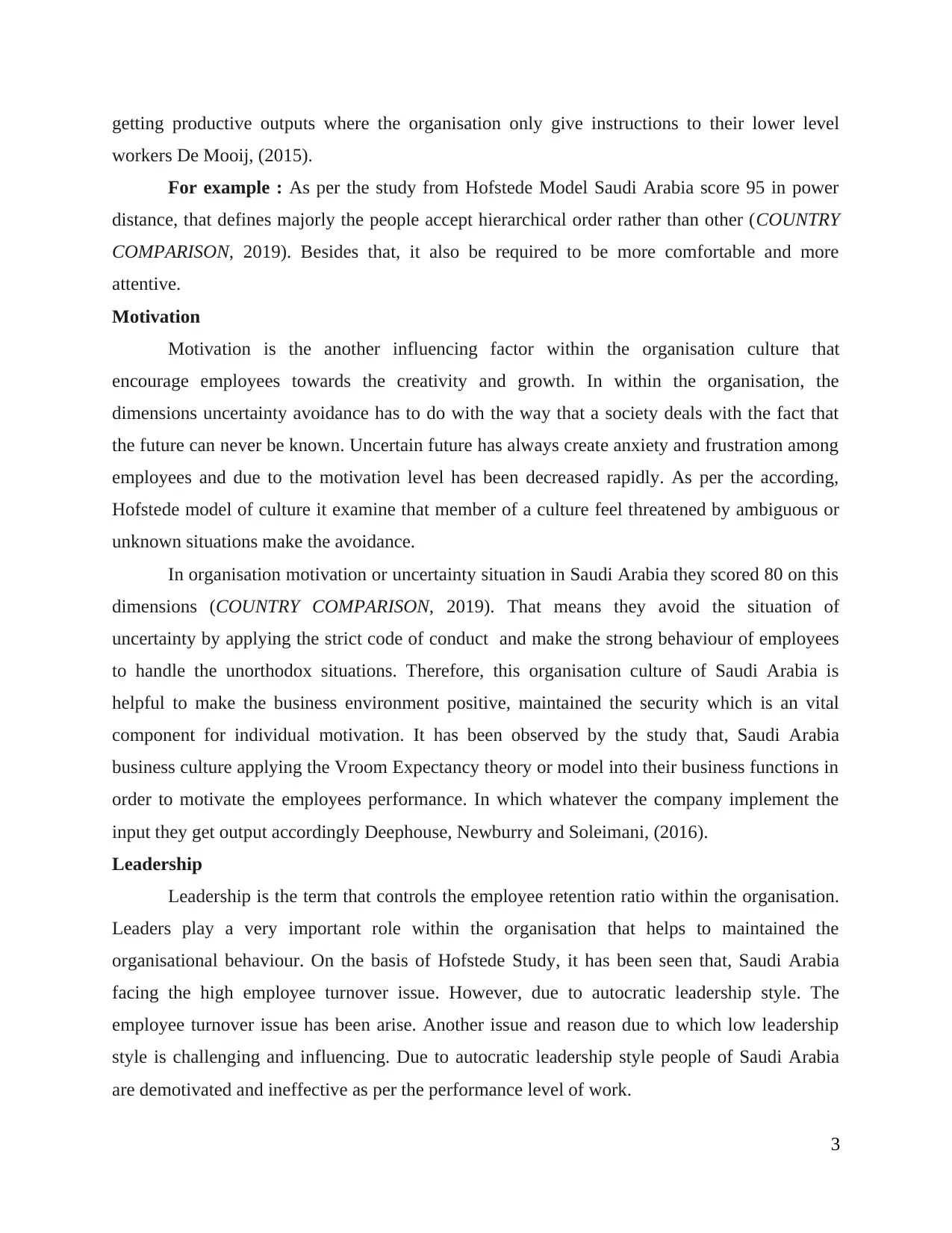
getting productive outputs where the organisation only give instructions to their lower level
workers De Mooij, (2015).
For example : As per the study from Hofstede Model Saudi Arabia score 95 in power
distance, that defines majorly the people accept hierarchical order rather than other (COUNTRY
COMPARISON, 2019). Besides that, it also be required to be more comfortable and more
attentive.
Motivation
Motivation is the another influencing factor within the organisation culture that
encourage employees towards the creativity and growth. In within the organisation, the
dimensions uncertainty avoidance has to do with the way that a society deals with the fact that
the future can never be known. Uncertain future has always create anxiety and frustration among
employees and due to the motivation level has been decreased rapidly. As per the according,
Hofstede model of culture it examine that member of a culture feel threatened by ambiguous or
unknown situations make the avoidance.
In organisation motivation or uncertainty situation in Saudi Arabia they scored 80 on this
dimensions (COUNTRY COMPARISON, 2019). That means they avoid the situation of
uncertainty by applying the strict code of conduct and make the strong behaviour of employees
to handle the unorthodox situations. Therefore, this organisation culture of Saudi Arabia is
helpful to make the business environment positive, maintained the security which is an vital
component for individual motivation. It has been observed by the study that, Saudi Arabia
business culture applying the Vroom Expectancy theory or model into their business functions in
order to motivate the employees performance. In which whatever the company implement the
input they get output accordingly Deephouse, Newburry and Soleimani, (2016).
Leadership
Leadership is the term that controls the employee retention ratio within the organisation.
Leaders play a very important role within the organisation that helps to maintained the
organisational behaviour. On the basis of Hofstede Study, it has been seen that, Saudi Arabia
facing the high employee turnover issue. However, due to autocratic leadership style. The
employee turnover issue has been arise. Another issue and reason due to which low leadership
style is challenging and influencing. Due to autocratic leadership style people of Saudi Arabia
are demotivated and ineffective as per the performance level of work.
3
workers De Mooij, (2015).
For example : As per the study from Hofstede Model Saudi Arabia score 95 in power
distance, that defines majorly the people accept hierarchical order rather than other (COUNTRY
COMPARISON, 2019). Besides that, it also be required to be more comfortable and more
attentive.
Motivation
Motivation is the another influencing factor within the organisation culture that
encourage employees towards the creativity and growth. In within the organisation, the
dimensions uncertainty avoidance has to do with the way that a society deals with the fact that
the future can never be known. Uncertain future has always create anxiety and frustration among
employees and due to the motivation level has been decreased rapidly. As per the according,
Hofstede model of culture it examine that member of a culture feel threatened by ambiguous or
unknown situations make the avoidance.
In organisation motivation or uncertainty situation in Saudi Arabia they scored 80 on this
dimensions (COUNTRY COMPARISON, 2019). That means they avoid the situation of
uncertainty by applying the strict code of conduct and make the strong behaviour of employees
to handle the unorthodox situations. Therefore, this organisation culture of Saudi Arabia is
helpful to make the business environment positive, maintained the security which is an vital
component for individual motivation. It has been observed by the study that, Saudi Arabia
business culture applying the Vroom Expectancy theory or model into their business functions in
order to motivate the employees performance. In which whatever the company implement the
input they get output accordingly Deephouse, Newburry and Soleimani, (2016).
Leadership
Leadership is the term that controls the employee retention ratio within the organisation.
Leaders play a very important role within the organisation that helps to maintained the
organisational behaviour. On the basis of Hofstede Study, it has been seen that, Saudi Arabia
facing the high employee turnover issue. However, due to autocratic leadership style. The
employee turnover issue has been arise. Another issue and reason due to which low leadership
style is challenging and influencing. Due to autocratic leadership style people of Saudi Arabia
are demotivated and ineffective as per the performance level of work.
3
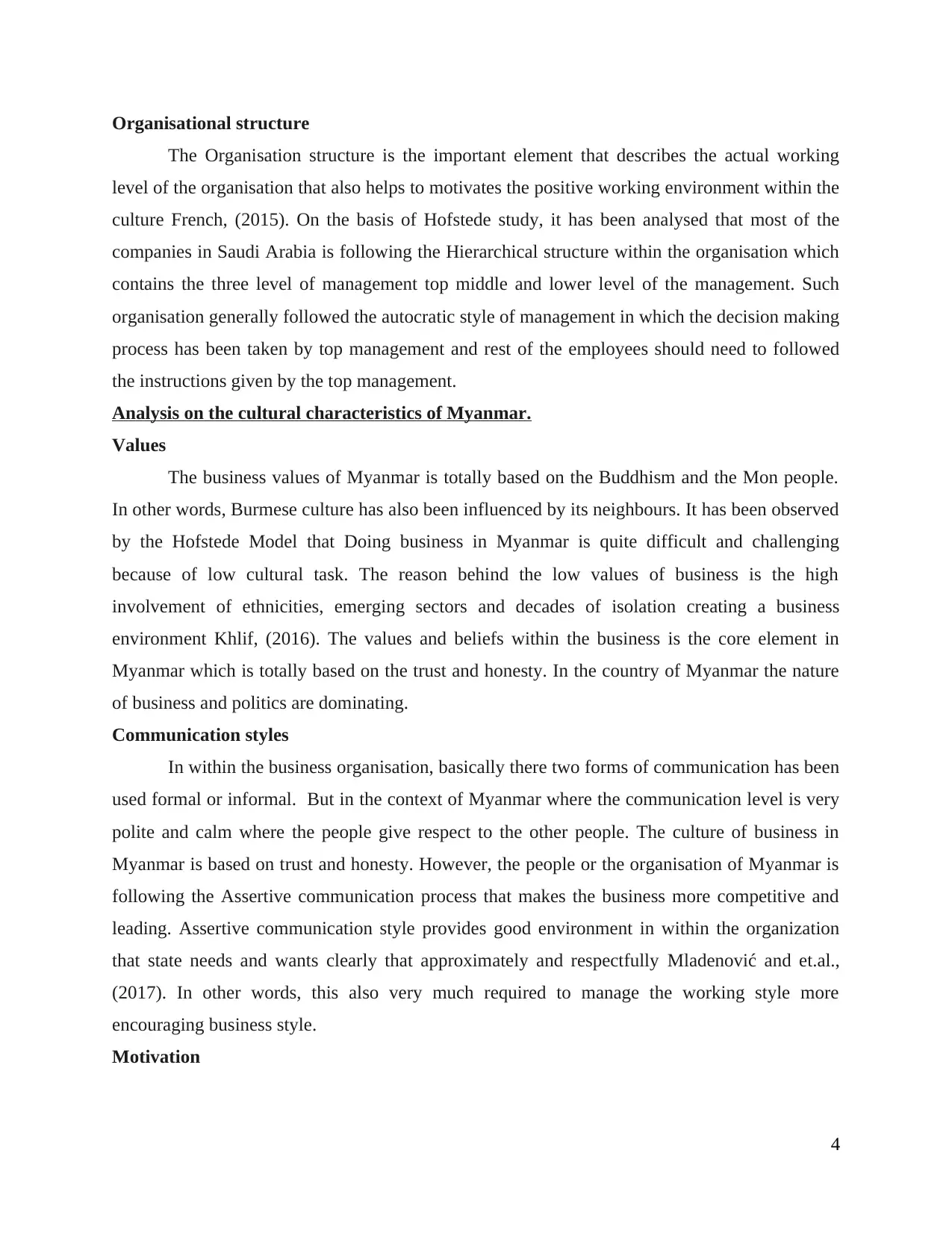
Organisational structure
The Organisation structure is the important element that describes the actual working
level of the organisation that also helps to motivates the positive working environment within the
culture French, (2015). On the basis of Hofstede study, it has been analysed that most of the
companies in Saudi Arabia is following the Hierarchical structure within the organisation which
contains the three level of management top middle and lower level of the management. Such
organisation generally followed the autocratic style of management in which the decision making
process has been taken by top management and rest of the employees should need to followed
the instructions given by the top management.
Analysis on the cultural characteristics of Myanmar.
Values
The business values of Myanmar is totally based on the Buddhism and the Mon people.
In other words, Burmese culture has also been influenced by its neighbours. It has been observed
by the Hofstede Model that Doing business in Myanmar is quite difficult and challenging
because of low cultural task. The reason behind the low values of business is the high
involvement of ethnicities, emerging sectors and decades of isolation creating a business
environment Khlif, (2016). The values and beliefs within the business is the core element in
Myanmar which is totally based on the trust and honesty. In the country of Myanmar the nature
of business and politics are dominating.
Communication styles
In within the business organisation, basically there two forms of communication has been
used formal or informal. But in the context of Myanmar where the communication level is very
polite and calm where the people give respect to the other people. The culture of business in
Myanmar is based on trust and honesty. However, the people or the organisation of Myanmar is
following the Assertive communication process that makes the business more competitive and
leading. Assertive communication style provides good environment in within the organization
that state needs and wants clearly that approximately and respectfully Mladenović and et.al.,
(2017). In other words, this also very much required to manage the working style more
encouraging business style.
Motivation
4
The Organisation structure is the important element that describes the actual working
level of the organisation that also helps to motivates the positive working environment within the
culture French, (2015). On the basis of Hofstede study, it has been analysed that most of the
companies in Saudi Arabia is following the Hierarchical structure within the organisation which
contains the three level of management top middle and lower level of the management. Such
organisation generally followed the autocratic style of management in which the decision making
process has been taken by top management and rest of the employees should need to followed
the instructions given by the top management.
Analysis on the cultural characteristics of Myanmar.
Values
The business values of Myanmar is totally based on the Buddhism and the Mon people.
In other words, Burmese culture has also been influenced by its neighbours. It has been observed
by the Hofstede Model that Doing business in Myanmar is quite difficult and challenging
because of low cultural task. The reason behind the low values of business is the high
involvement of ethnicities, emerging sectors and decades of isolation creating a business
environment Khlif, (2016). The values and beliefs within the business is the core element in
Myanmar which is totally based on the trust and honesty. In the country of Myanmar the nature
of business and politics are dominating.
Communication styles
In within the business organisation, basically there two forms of communication has been
used formal or informal. But in the context of Myanmar where the communication level is very
polite and calm where the people give respect to the other people. The culture of business in
Myanmar is based on trust and honesty. However, the people or the organisation of Myanmar is
following the Assertive communication process that makes the business more competitive and
leading. Assertive communication style provides good environment in within the organization
that state needs and wants clearly that approximately and respectfully Mladenović and et.al.,
(2017). In other words, this also very much required to manage the working style more
encouraging business style.
Motivation
4
⊘ This is a preview!⊘
Do you want full access?
Subscribe today to unlock all pages.

Trusted by 1+ million students worldwide
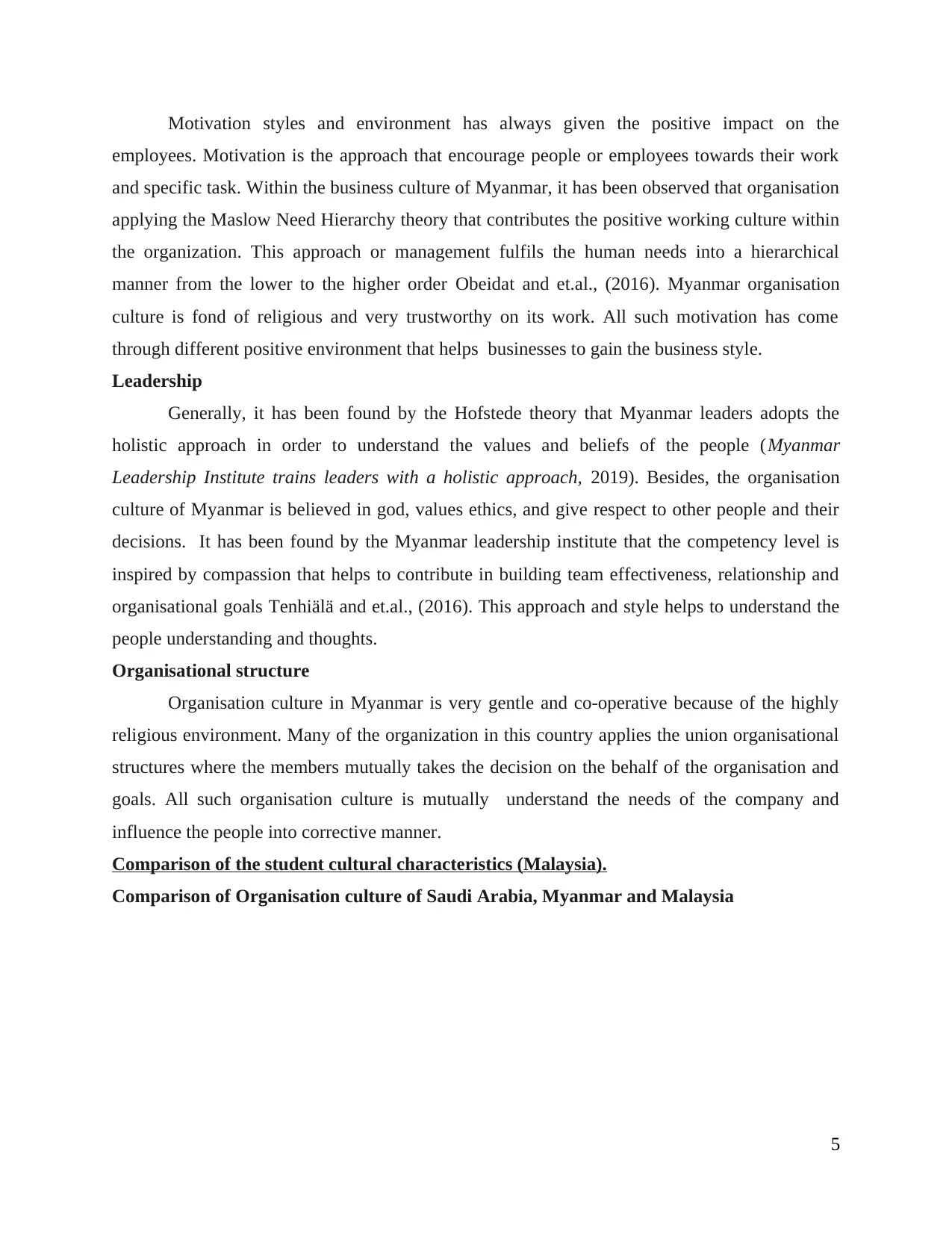
Motivation styles and environment has always given the positive impact on the
employees. Motivation is the approach that encourage people or employees towards their work
and specific task. Within the business culture of Myanmar, it has been observed that organisation
applying the Maslow Need Hierarchy theory that contributes the positive working culture within
the organization. This approach or management fulfils the human needs into a hierarchical
manner from the lower to the higher order Obeidat and et.al., (2016). Myanmar organisation
culture is fond of religious and very trustworthy on its work. All such motivation has come
through different positive environment that helps businesses to gain the business style.
Leadership
Generally, it has been found by the Hofstede theory that Myanmar leaders adopts the
holistic approach in order to understand the values and beliefs of the people (Myanmar
Leadership Institute trains leaders with a holistic approach, 2019). Besides, the organisation
culture of Myanmar is believed in god, values ethics, and give respect to other people and their
decisions. It has been found by the Myanmar leadership institute that the competency level is
inspired by compassion that helps to contribute in building team effectiveness, relationship and
organisational goals Tenhiälä and et.al., (2016). This approach and style helps to understand the
people understanding and thoughts.
Organisational structure
Organisation culture in Myanmar is very gentle and co-operative because of the highly
religious environment. Many of the organization in this country applies the union organisational
structures where the members mutually takes the decision on the behalf of the organisation and
goals. All such organisation culture is mutually understand the needs of the company and
influence the people into corrective manner.
Comparison of the student cultural characteristics (Malaysia).
Comparison of Organisation culture of Saudi Arabia, Myanmar and Malaysia
5
employees. Motivation is the approach that encourage people or employees towards their work
and specific task. Within the business culture of Myanmar, it has been observed that organisation
applying the Maslow Need Hierarchy theory that contributes the positive working culture within
the organization. This approach or management fulfils the human needs into a hierarchical
manner from the lower to the higher order Obeidat and et.al., (2016). Myanmar organisation
culture is fond of religious and very trustworthy on its work. All such motivation has come
through different positive environment that helps businesses to gain the business style.
Leadership
Generally, it has been found by the Hofstede theory that Myanmar leaders adopts the
holistic approach in order to understand the values and beliefs of the people (Myanmar
Leadership Institute trains leaders with a holistic approach, 2019). Besides, the organisation
culture of Myanmar is believed in god, values ethics, and give respect to other people and their
decisions. It has been found by the Myanmar leadership institute that the competency level is
inspired by compassion that helps to contribute in building team effectiveness, relationship and
organisational goals Tenhiälä and et.al., (2016). This approach and style helps to understand the
people understanding and thoughts.
Organisational structure
Organisation culture in Myanmar is very gentle and co-operative because of the highly
religious environment. Many of the organization in this country applies the union organisational
structures where the members mutually takes the decision on the behalf of the organisation and
goals. All such organisation culture is mutually understand the needs of the company and
influence the people into corrective manner.
Comparison of the student cultural characteristics (Malaysia).
Comparison of Organisation culture of Saudi Arabia, Myanmar and Malaysia
5
Paraphrase This Document
Need a fresh take? Get an instant paraphrase of this document with our AI Paraphraser
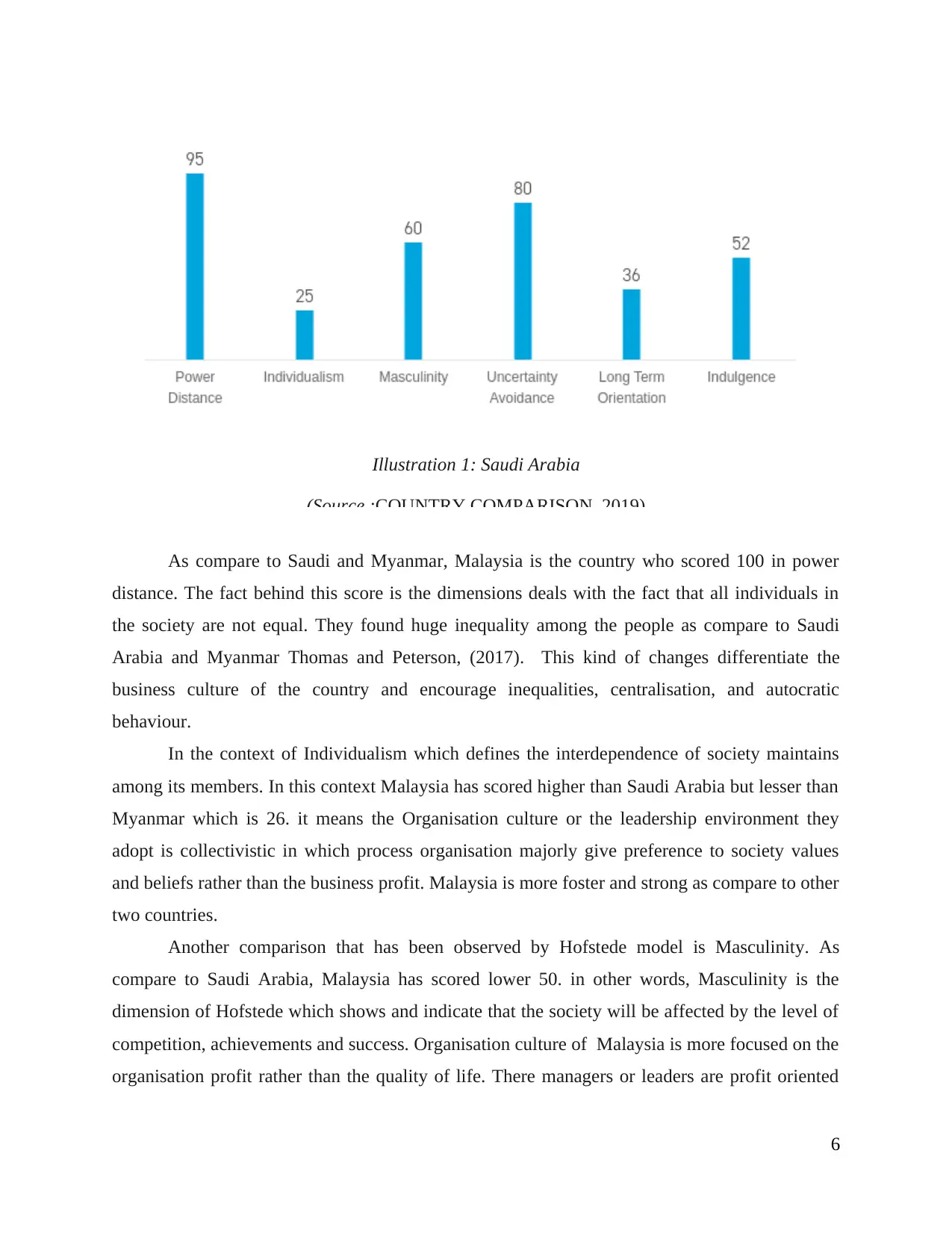
As compare to Saudi and Myanmar, Malaysia is the country who scored 100 in power
distance. The fact behind this score is the dimensions deals with the fact that all individuals in
the society are not equal. They found huge inequality among the people as compare to Saudi
Arabia and Myanmar Thomas and Peterson, (2017). This kind of changes differentiate the
business culture of the country and encourage inequalities, centralisation, and autocratic
behaviour.
In the context of Individualism which defines the interdependence of society maintains
among its members. In this context Malaysia has scored higher than Saudi Arabia but lesser than
Myanmar which is 26. it means the Organisation culture or the leadership environment they
adopt is collectivistic in which process organisation majorly give preference to society values
and beliefs rather than the business profit. Malaysia is more foster and strong as compare to other
two countries.
Another comparison that has been observed by Hofstede model is Masculinity. As
compare to Saudi Arabia, Malaysia has scored lower 50. in other words, Masculinity is the
dimension of Hofstede which shows and indicate that the society will be affected by the level of
competition, achievements and success. Organisation culture of Malaysia is more focused on the
organisation profit rather than the quality of life. There managers or leaders are profit oriented
6
Illustration 1: Saudi Arabia
(Source :COUNTRY COMPARISON. 2019)
distance. The fact behind this score is the dimensions deals with the fact that all individuals in
the society are not equal. They found huge inequality among the people as compare to Saudi
Arabia and Myanmar Thomas and Peterson, (2017). This kind of changes differentiate the
business culture of the country and encourage inequalities, centralisation, and autocratic
behaviour.
In the context of Individualism which defines the interdependence of society maintains
among its members. In this context Malaysia has scored higher than Saudi Arabia but lesser than
Myanmar which is 26. it means the Organisation culture or the leadership environment they
adopt is collectivistic in which process organisation majorly give preference to society values
and beliefs rather than the business profit. Malaysia is more foster and strong as compare to other
two countries.
Another comparison that has been observed by Hofstede model is Masculinity. As
compare to Saudi Arabia, Malaysia has scored lower 50. in other words, Masculinity is the
dimension of Hofstede which shows and indicate that the society will be affected by the level of
competition, achievements and success. Organisation culture of Malaysia is more focused on the
organisation profit rather than the quality of life. There managers or leaders are profit oriented
6
Illustration 1: Saudi Arabia
(Source :COUNTRY COMPARISON. 2019)
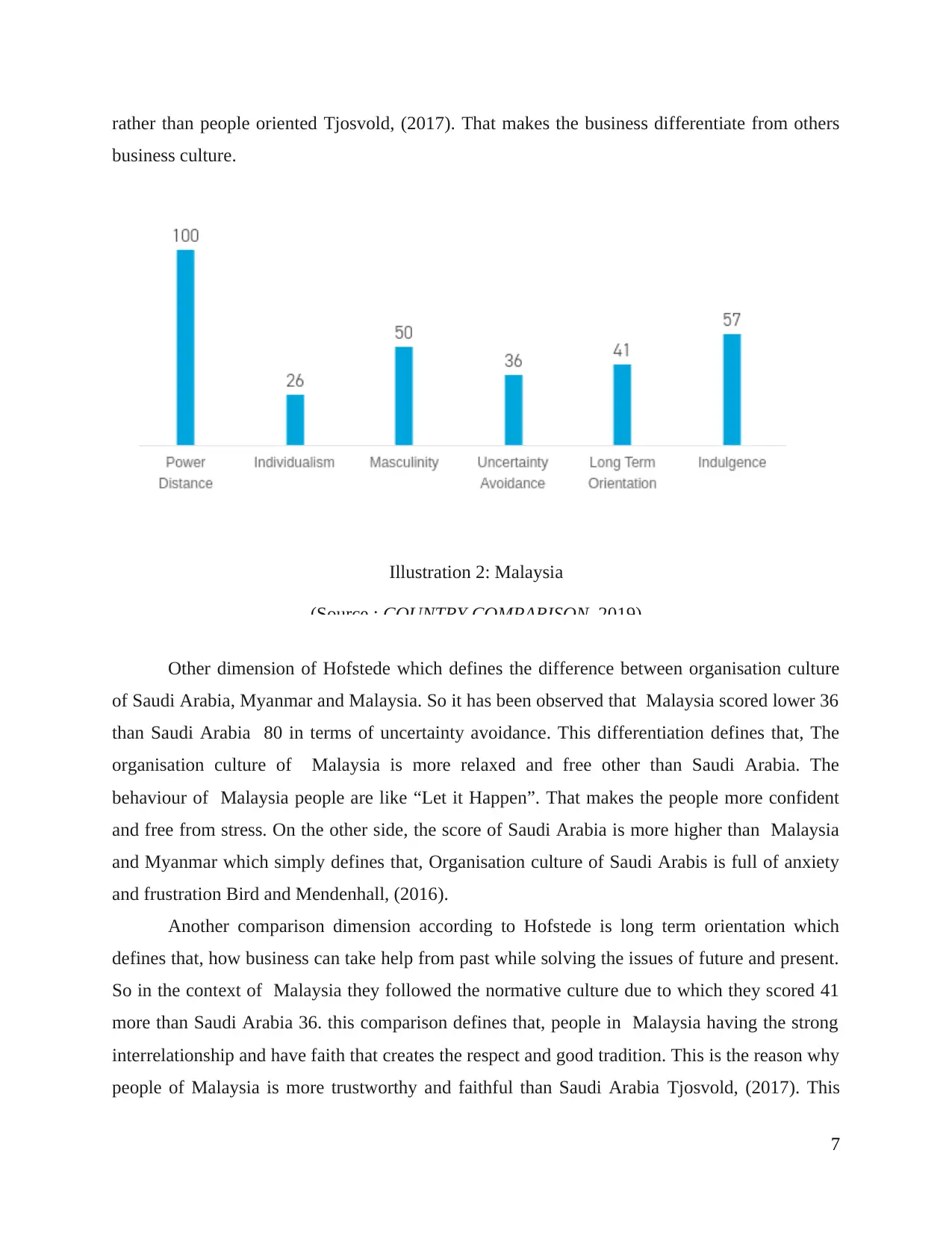
rather than people oriented Tjosvold, (2017). That makes the business differentiate from others
business culture.
Other dimension of Hofstede which defines the difference between organisation culture
of Saudi Arabia, Myanmar and Malaysia. So it has been observed that Malaysia scored lower 36
than Saudi Arabia 80 in terms of uncertainty avoidance. This differentiation defines that, The
organisation culture of Malaysia is more relaxed and free other than Saudi Arabia. The
behaviour of Malaysia people are like “Let it Happen”. That makes the people more confident
and free from stress. On the other side, the score of Saudi Arabia is more higher than Malaysia
and Myanmar which simply defines that, Organisation culture of Saudi Arabis is full of anxiety
and frustration Bird and Mendenhall, (2016).
Another comparison dimension according to Hofstede is long term orientation which
defines that, how business can take help from past while solving the issues of future and present.
So in the context of Malaysia they followed the normative culture due to which they scored 41
more than Saudi Arabia 36. this comparison defines that, people in Malaysia having the strong
interrelationship and have faith that creates the respect and good tradition. This is the reason why
people of Malaysia is more trustworthy and faithful than Saudi Arabia Tjosvold, (2017). This
7
Illustration 2: Malaysia
(Source : COUNTRY COMPARISON. 2019)
business culture.
Other dimension of Hofstede which defines the difference between organisation culture
of Saudi Arabia, Myanmar and Malaysia. So it has been observed that Malaysia scored lower 36
than Saudi Arabia 80 in terms of uncertainty avoidance. This differentiation defines that, The
organisation culture of Malaysia is more relaxed and free other than Saudi Arabia. The
behaviour of Malaysia people are like “Let it Happen”. That makes the people more confident
and free from stress. On the other side, the score of Saudi Arabia is more higher than Malaysia
and Myanmar which simply defines that, Organisation culture of Saudi Arabis is full of anxiety
and frustration Bird and Mendenhall, (2016).
Another comparison dimension according to Hofstede is long term orientation which
defines that, how business can take help from past while solving the issues of future and present.
So in the context of Malaysia they followed the normative culture due to which they scored 41
more than Saudi Arabia 36. this comparison defines that, people in Malaysia having the strong
interrelationship and have faith that creates the respect and good tradition. This is the reason why
people of Malaysia is more trustworthy and faithful than Saudi Arabia Tjosvold, (2017). This
7
Illustration 2: Malaysia
(Source : COUNTRY COMPARISON. 2019)
⊘ This is a preview!⊘
Do you want full access?
Subscribe today to unlock all pages.

Trusted by 1+ million students worldwide
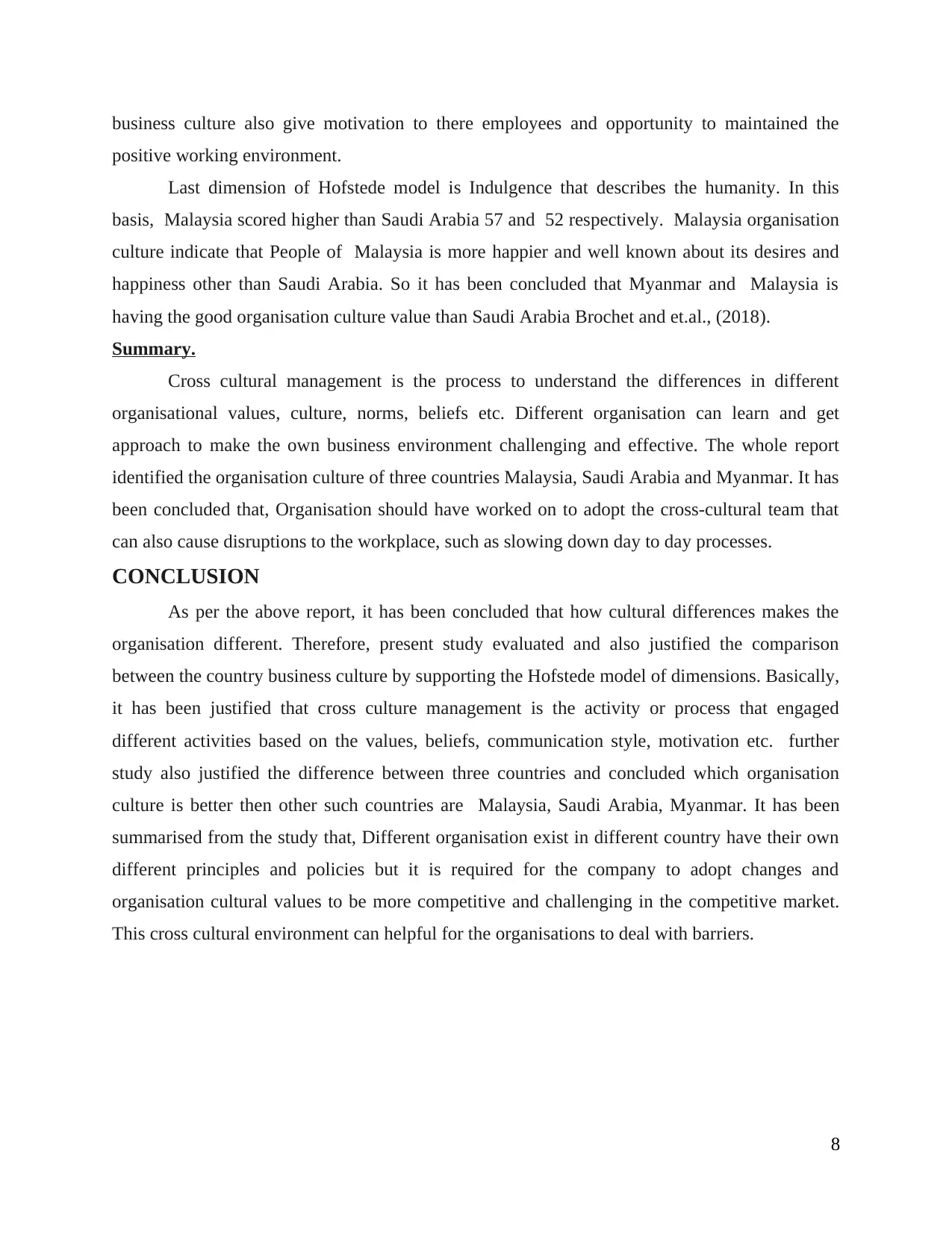
business culture also give motivation to there employees and opportunity to maintained the
positive working environment.
Last dimension of Hofstede model is Indulgence that describes the humanity. In this
basis, Malaysia scored higher than Saudi Arabia 57 and 52 respectively. Malaysia organisation
culture indicate that People of Malaysia is more happier and well known about its desires and
happiness other than Saudi Arabia. So it has been concluded that Myanmar and Malaysia is
having the good organisation culture value than Saudi Arabia Brochet and et.al., (2018).
Summary.
Cross cultural management is the process to understand the differences in different
organisational values, culture, norms, beliefs etc. Different organisation can learn and get
approach to make the own business environment challenging and effective. The whole report
identified the organisation culture of three countries Malaysia, Saudi Arabia and Myanmar. It has
been concluded that, Organisation should have worked on to adopt the cross-cultural team that
can also cause disruptions to the workplace, such as slowing down day to day processes.
CONCLUSION
As per the above report, it has been concluded that how cultural differences makes the
organisation different. Therefore, present study evaluated and also justified the comparison
between the country business culture by supporting the Hofstede model of dimensions. Basically,
it has been justified that cross culture management is the activity or process that engaged
different activities based on the values, beliefs, communication style, motivation etc. further
study also justified the difference between three countries and concluded which organisation
culture is better then other such countries are Malaysia, Saudi Arabia, Myanmar. It has been
summarised from the study that, Different organisation exist in different country have their own
different principles and policies but it is required for the company to adopt changes and
organisation cultural values to be more competitive and challenging in the competitive market.
This cross cultural environment can helpful for the organisations to deal with barriers.
8
positive working environment.
Last dimension of Hofstede model is Indulgence that describes the humanity. In this
basis, Malaysia scored higher than Saudi Arabia 57 and 52 respectively. Malaysia organisation
culture indicate that People of Malaysia is more happier and well known about its desires and
happiness other than Saudi Arabia. So it has been concluded that Myanmar and Malaysia is
having the good organisation culture value than Saudi Arabia Brochet and et.al., (2018).
Summary.
Cross cultural management is the process to understand the differences in different
organisational values, culture, norms, beliefs etc. Different organisation can learn and get
approach to make the own business environment challenging and effective. The whole report
identified the organisation culture of three countries Malaysia, Saudi Arabia and Myanmar. It has
been concluded that, Organisation should have worked on to adopt the cross-cultural team that
can also cause disruptions to the workplace, such as slowing down day to day processes.
CONCLUSION
As per the above report, it has been concluded that how cultural differences makes the
organisation different. Therefore, present study evaluated and also justified the comparison
between the country business culture by supporting the Hofstede model of dimensions. Basically,
it has been justified that cross culture management is the activity or process that engaged
different activities based on the values, beliefs, communication style, motivation etc. further
study also justified the difference between three countries and concluded which organisation
culture is better then other such countries are Malaysia, Saudi Arabia, Myanmar. It has been
summarised from the study that, Different organisation exist in different country have their own
different principles and policies but it is required for the company to adopt changes and
organisation cultural values to be more competitive and challenging in the competitive market.
This cross cultural environment can helpful for the organisations to deal with barriers.
8
Paraphrase This Document
Need a fresh take? Get an instant paraphrase of this document with our AI Paraphraser
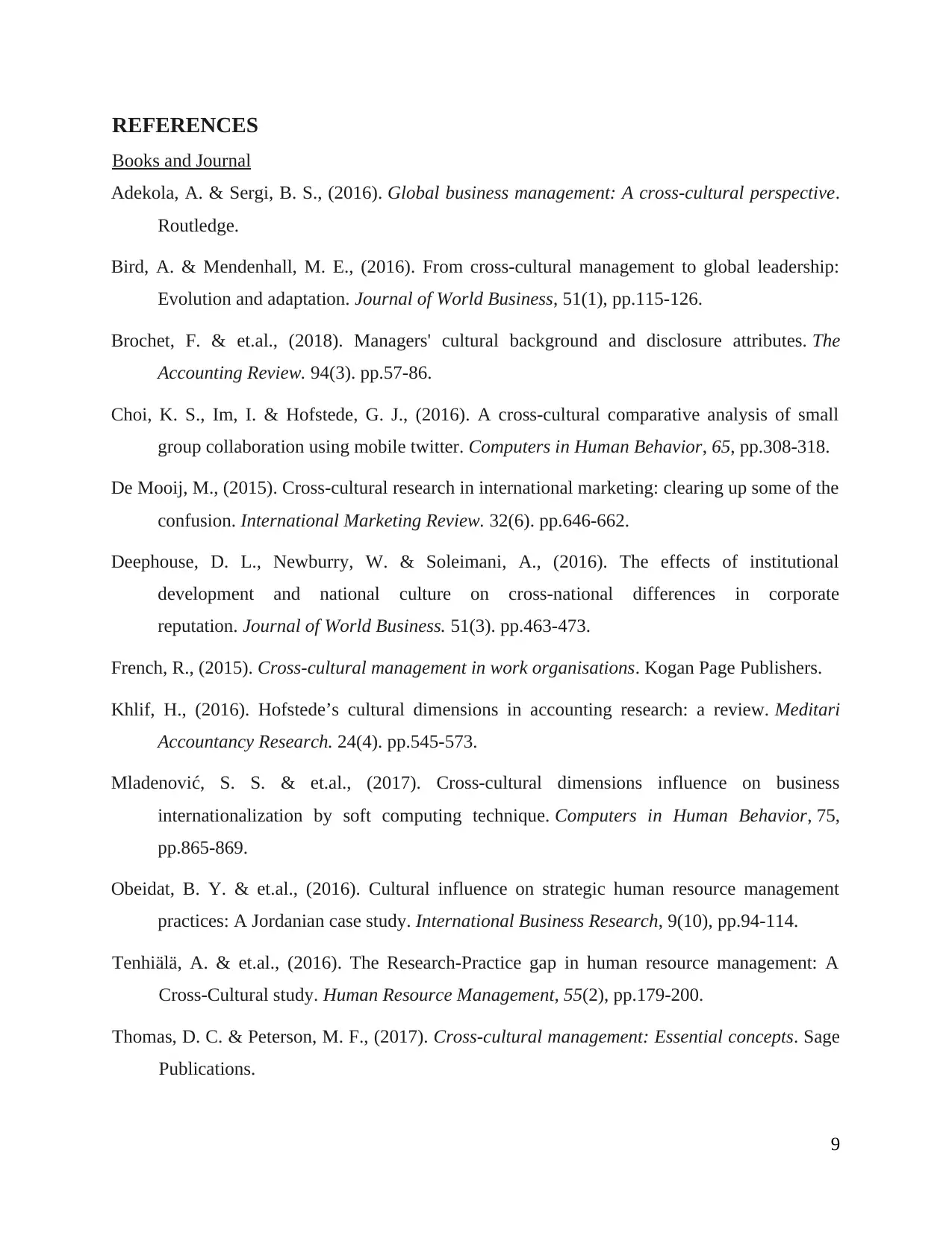
REFERENCES
Books and Journal
Adekola, A. & Sergi, B. S., (2016). Global business management: A cross-cultural perspective.
Routledge.
Bird, A. & Mendenhall, M. E., (2016). From cross-cultural management to global leadership:
Evolution and adaptation. Journal of World Business, 51(1), pp.115-126.
Brochet, F. & et.al., (2018). Managers' cultural background and disclosure attributes. The
Accounting Review. 94(3). pp.57-86.
Choi, K. S., Im, I. & Hofstede, G. J., (2016). A cross-cultural comparative analysis of small
group collaboration using mobile twitter. Computers in Human Behavior, 65, pp.308-318.
De Mooij, M., (2015). Cross-cultural research in international marketing: clearing up some of the
confusion. International Marketing Review. 32(6). pp.646-662.
Deephouse, D. L., Newburry, W. & Soleimani, A., (2016). The effects of institutional
development and national culture on cross-national differences in corporate
reputation. Journal of World Business. 51(3). pp.463-473.
French, R., (2015). Cross-cultural management in work organisations. Kogan Page Publishers.
Khlif, H., (2016). Hofstede’s cultural dimensions in accounting research: a review. Meditari
Accountancy Research. 24(4). pp.545-573.
Mladenović, S. S. & et.al., (2017). Cross-cultural dimensions influence on business
internationalization by soft computing technique. Computers in Human Behavior, 75,
pp.865-869.
Obeidat, B. Y. & et.al., (2016). Cultural influence on strategic human resource management
practices: A Jordanian case study. International Business Research, 9(10), pp.94-114.
Tenhiälä, A. & et.al., (2016). The Research‐Practice gap in human resource management: A
Cross‐Cultural study. Human Resource Management, 55(2), pp.179-200.
Thomas, D. C. & Peterson, M. F., (2017). Cross-cultural management: Essential concepts. Sage
Publications.
9
Books and Journal
Adekola, A. & Sergi, B. S., (2016). Global business management: A cross-cultural perspective.
Routledge.
Bird, A. & Mendenhall, M. E., (2016). From cross-cultural management to global leadership:
Evolution and adaptation. Journal of World Business, 51(1), pp.115-126.
Brochet, F. & et.al., (2018). Managers' cultural background and disclosure attributes. The
Accounting Review. 94(3). pp.57-86.
Choi, K. S., Im, I. & Hofstede, G. J., (2016). A cross-cultural comparative analysis of small
group collaboration using mobile twitter. Computers in Human Behavior, 65, pp.308-318.
De Mooij, M., (2015). Cross-cultural research in international marketing: clearing up some of the
confusion. International Marketing Review. 32(6). pp.646-662.
Deephouse, D. L., Newburry, W. & Soleimani, A., (2016). The effects of institutional
development and national culture on cross-national differences in corporate
reputation. Journal of World Business. 51(3). pp.463-473.
French, R., (2015). Cross-cultural management in work organisations. Kogan Page Publishers.
Khlif, H., (2016). Hofstede’s cultural dimensions in accounting research: a review. Meditari
Accountancy Research. 24(4). pp.545-573.
Mladenović, S. S. & et.al., (2017). Cross-cultural dimensions influence on business
internationalization by soft computing technique. Computers in Human Behavior, 75,
pp.865-869.
Obeidat, B. Y. & et.al., (2016). Cultural influence on strategic human resource management
practices: A Jordanian case study. International Business Research, 9(10), pp.94-114.
Tenhiälä, A. & et.al., (2016). The Research‐Practice gap in human resource management: A
Cross‐Cultural study. Human Resource Management, 55(2), pp.179-200.
Thomas, D. C. & Peterson, M. F., (2017). Cross-cultural management: Essential concepts. Sage
Publications.
9
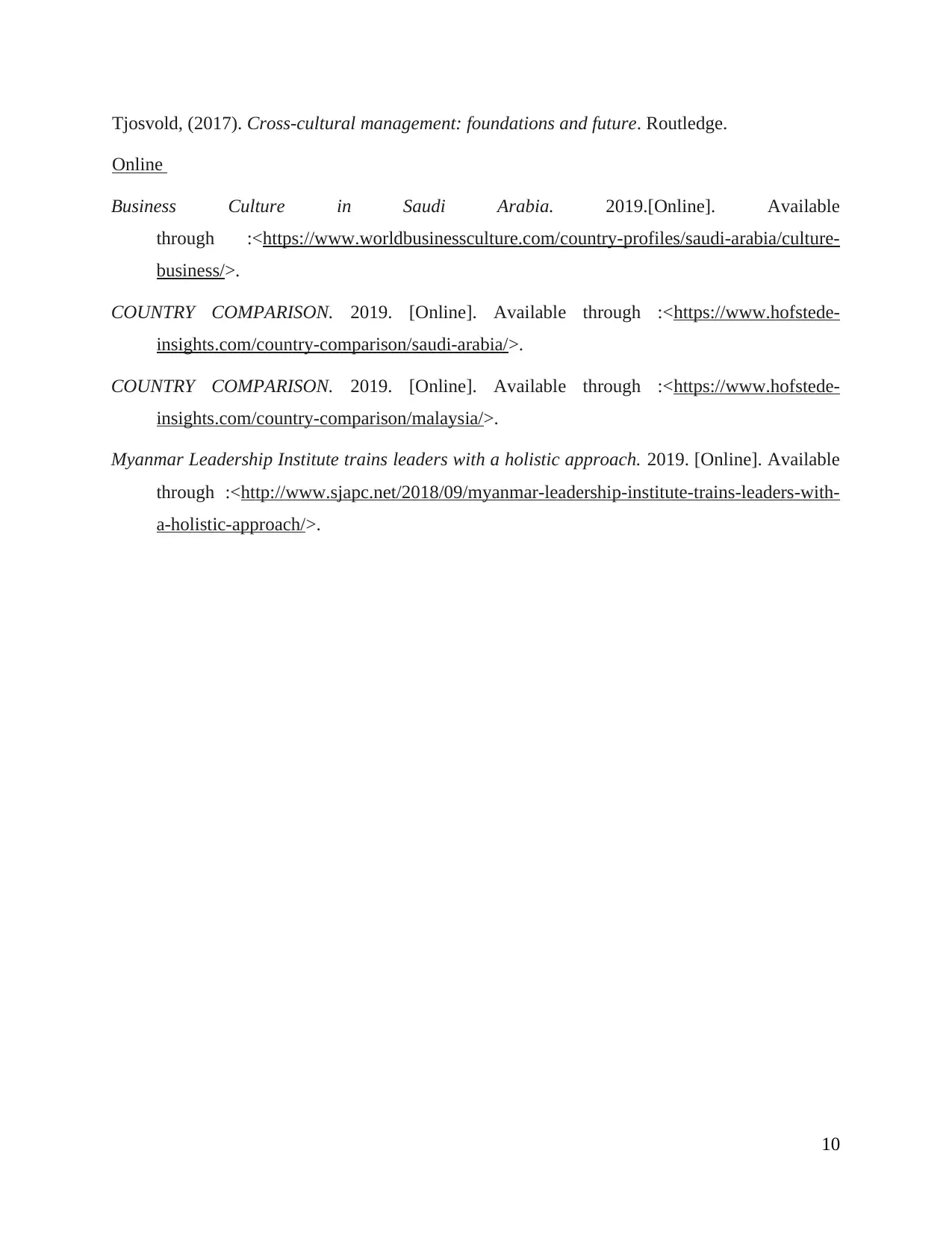
Tjosvold, (2017). Cross-cultural management: foundations and future. Routledge.
Online
Business Culture in Saudi Arabia. 2019.[Online]. Available
through :<https://www.worldbusinessculture.com/country-profiles/saudi-arabia/culture-
business/>.
COUNTRY COMPARISON. 2019. [Online]. Available through :<https://www.hofstede-
insights.com/country-comparison/saudi-arabia/>.
COUNTRY COMPARISON. 2019. [Online]. Available through :<https://www.hofstede-
insights.com/country-comparison/malaysia/>.
Myanmar Leadership Institute trains leaders with a holistic approach. 2019. [Online]. Available
through :<http://www.sjapc.net/2018/09/myanmar-leadership-institute-trains-leaders-with-
a-holistic-approach/>.
10
Online
Business Culture in Saudi Arabia. 2019.[Online]. Available
through :<https://www.worldbusinessculture.com/country-profiles/saudi-arabia/culture-
business/>.
COUNTRY COMPARISON. 2019. [Online]. Available through :<https://www.hofstede-
insights.com/country-comparison/saudi-arabia/>.
COUNTRY COMPARISON. 2019. [Online]. Available through :<https://www.hofstede-
insights.com/country-comparison/malaysia/>.
Myanmar Leadership Institute trains leaders with a holistic approach. 2019. [Online]. Available
through :<http://www.sjapc.net/2018/09/myanmar-leadership-institute-trains-leaders-with-
a-holistic-approach/>.
10
⊘ This is a preview!⊘
Do you want full access?
Subscribe today to unlock all pages.

Trusted by 1+ million students worldwide
1 out of 13
Related Documents
Your All-in-One AI-Powered Toolkit for Academic Success.
+13062052269
info@desklib.com
Available 24*7 on WhatsApp / Email
![[object Object]](/_next/static/media/star-bottom.7253800d.svg)
Unlock your academic potential
Copyright © 2020–2026 A2Z Services. All Rights Reserved. Developed and managed by ZUCOL.




